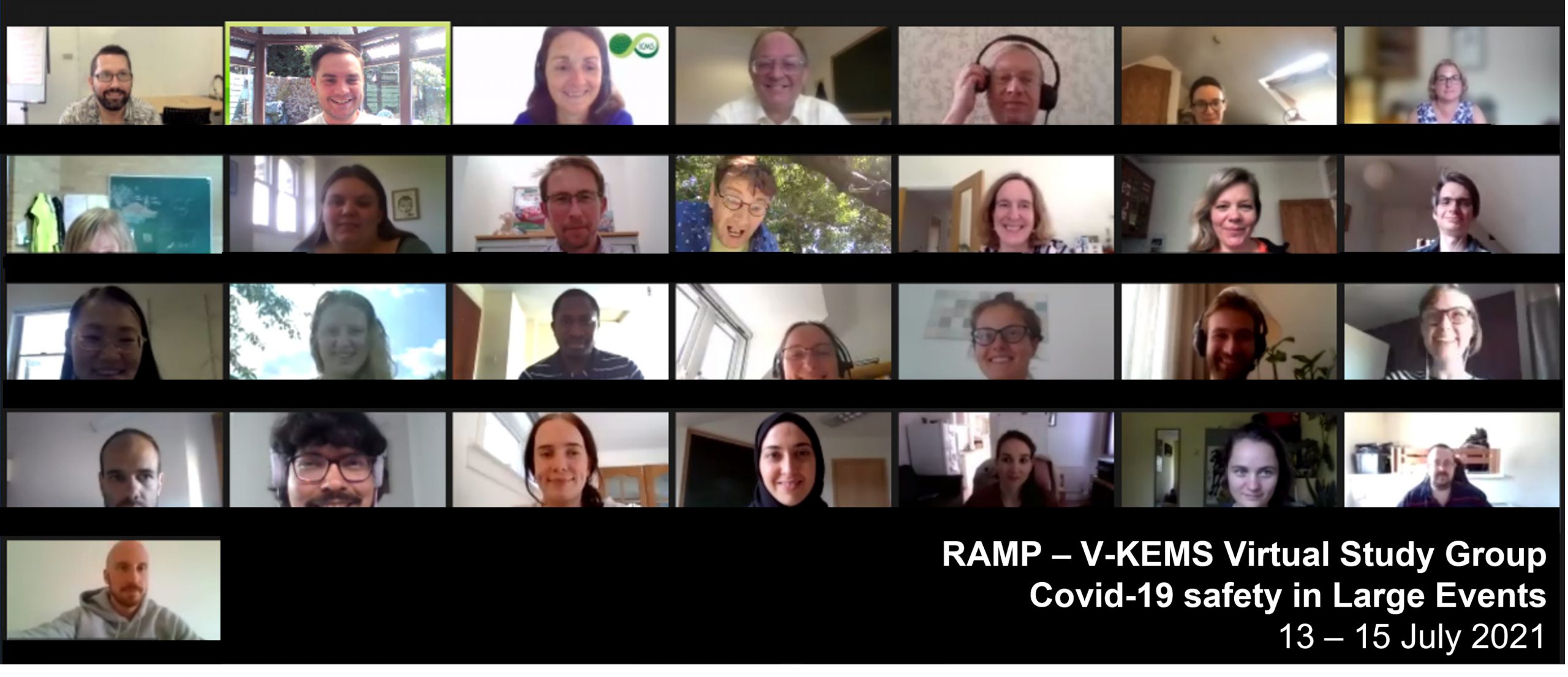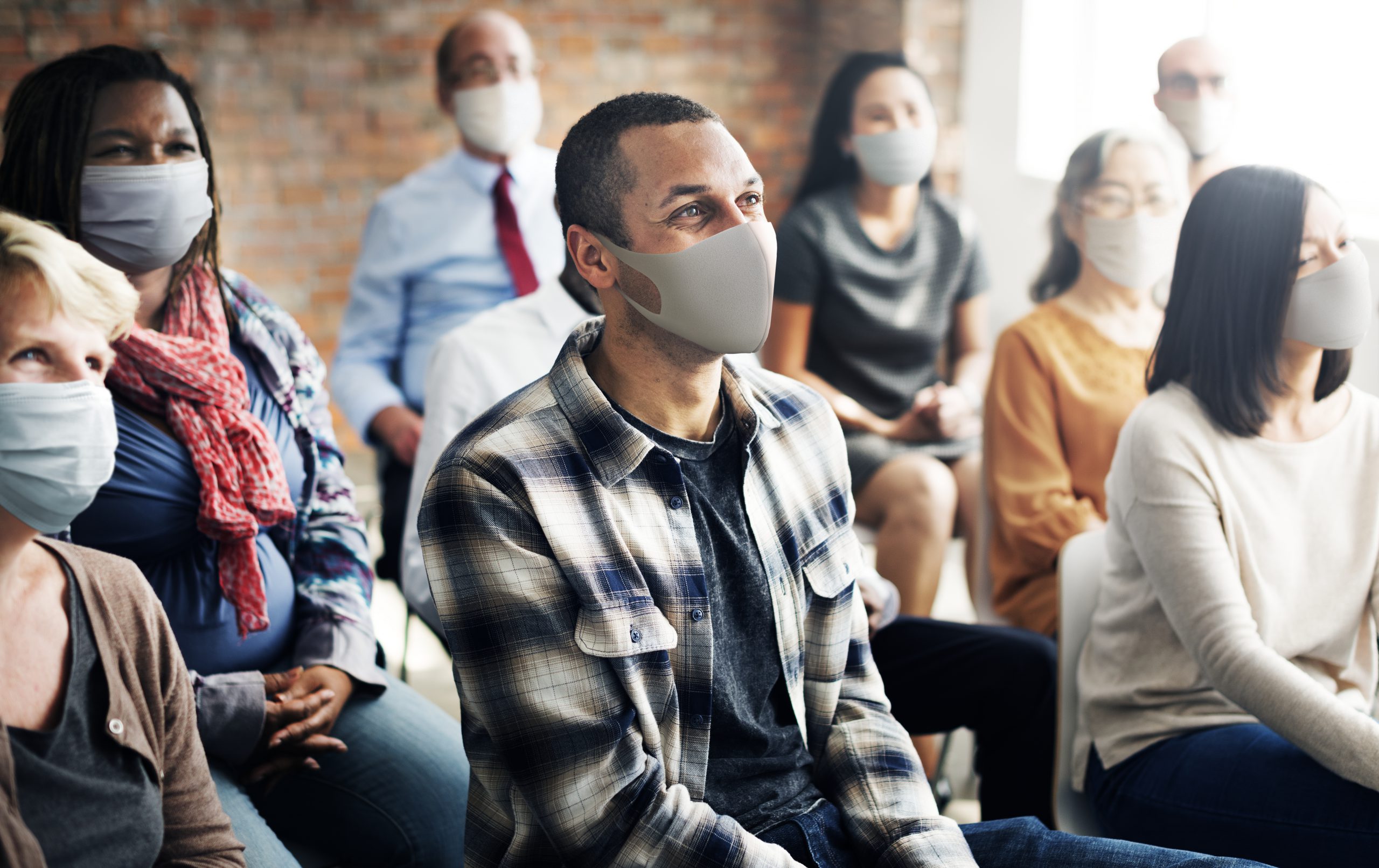Covid-19 safety in large events: supporting the events industry through mathematical sciences

The events industry has been particularly impacted by the pandemic. KTN recently advised several large event operators on how transmission risk can be understood and managed as large event gatherings reopen.
The events industry has been particularly impacted by the pandemic. Opening large events involves understanding the relative risk of various interventions. The Virtual Forum for Knowledge Exchange in the Mathematical Sciences (V-KEMS) – which includes KTN – recently provided insight to some large event operators on how transmission risk might be understood and managed at large event gatherings.
The events industry in the UK is a major contributor to GDP, contributing an estimated £70 billion to the economy and providing 700,000 jobs. However, the pandemic has seen a significant reduction in demand for events, with 40 % of all those in the sector suggesting that the business they are involved in may not exist in its current form within the next 6 – 12 months. Despite government backed research programmes and guidance, significant challenges remain in coordinating the operations of large event spaces and a lack of understanding of how risk mitigation strategies might be translated into guidance.
"“Working with the RAMP (Rapid Assistance in Modelling the Pandemic) continuity programme and the JUNIPER (Joint UNIversities Pandemic and Epidemiological Research) consortium, the challenges associated with live large events quickly emerged as a pressing area of concern. Cited by so many stakeholders at the forefront of the Covid-19 recovery, in the end, it felt like large live events chose itself as the topic for this virtual study group!”"
Dawn Wasley, International Centre for the Mathematical Sciences
Between the 13th – 15th July 2021, V-KEMS which includes KTN, the Isaac Newton Institute, the International Centre for Mathematical Sciences and the Newton Gateway to Mathematics, convened a group of around 30 mathematical scientists, behavioural scientists, public health experts and representatives from the events industry in a virtual study group (VSG) to discuss what mathematical science could be applied to the challenges the industry is currently facing. The resultant conversations outlined where mathematical science can provide insight, and allow event organisers to make decisions are based on an assessment of risk.

Virtual study group discussion points
During the three day session, the group heard from organisers who were running a variety of events; large indoor gatherings, large outdoor – festival type – gatherings, large outdoor events where attendees are seated:
What about indoor events?
- Can we control the length and geometry of a queue to minimise infection risk?
- Can we estimate the viral load at a venue given a certain testing regime?
- Can ventilation be designed to minimise the virus concentration in a room?
What about outside, ticketed events?
- Can we model and mitigate risk from an events arrival process?
- Can we model and mitigate the risk of crowds using events facilities?
What about outside and unticketed events?
- Can we estimate the person-to-person transmission probability outdoors?
- Can we quantify the risk amongst a crowd watching a performer?
- Can we model crowd behaviour? Including bottlenecks, density, followers and leaders?
Outcomes
These questions were looked at in detail by the convened groups of researchers. These researchers modelled the impact of queuing geometries, staggering arrival times, signage, and some process of pre-checking to provide insight for the event organisers. For some considered scenarios the benefits of long queues and pre-checking (to reduce waiting time) were demonstrated.
Regarding the question of relative risk when watching a street performer, dynamic, unticketed spaces such as open festivals provide a challenge in managing crowds. Traditional large events guidance is not strictly applicable given the organic, devolved authority in an open festival which is made up of free agents for example street performers. What modelling techniques could be used to understand how unmanaged activities such as these street performers can change the relative risk of transmission, and what interventions are likely to be effective?
The group approached this challenge using models to simulate the movement of individuals in an open space over a period of time whilst watching a street performance. The relative impact of wearing a mask in an audience compared with shortening the duration of the show was considered and tentatively suggests that mask-wearing during a performance would be the most effective measure to reduce transmission risk.

"“Thank you for this - it’s going to be hugely helpful in supporting performers to engage with crowds safely, and the key advice is both digestible and useful!”"
Lyndsey Jackson, Deputy Chief Executive, Edinburgh Festival Fringe Society
More information
Click here to view the Covid-19 safety in large events V-KEMS report. The virtual study group has collaboratively created this working paper over the last few months and contains a collection of detailed, valuable insights so is a worthwhile read.
V-KEMS will be running more sessions to support business recovery from the effects of the pandemic. If you are interested in the insights generated through this work or would be interested in participating in a future session (either as a problem owner or a solution provider), please do contact KTN. Also, please explore the research and development that the KTN Industrial Mathematics team has completed.
Click here to learn more about V-KEMS, follow V-KEMS on Twitter, and please contact KTN to discuss working together to apply advanced mathematics and solve complex systems within your organisation.
Related Content
Related Opportunities
KTN-iX challenge: Industrial Decarbonisation Solutions
Opens: 06/07/2021 Closes: 30/09/2021
EQUANS, part of the ENGIE Group, is looking for SME’s with innovative industrial decarbonisation solutions who are interested in corporate strategic investment. Through this iX challenge, EQUANS is looking for disruptive tools that will support the end to end process from identifying, appraising a
More Information
Global cooperation feasibility studies for SMEs
Opens: 09/08/2021 Closes: 03/09/2021
The aim of this competition is to increase the international engagement of innovative UK registered SMEs. It will support them in looking to establish or strengthen international research and innovation partnerships and networks and aid them to grow and scale up.
More Information
Horizon Europe Work Programme 2021-2022: Civil Security for Society - Cluster 3
Opens: 09/08/2021 Closes: 23/11/2022
Horizon Europe has a wide variety of open calls for civil security for society, with closing dates in September, October or November 2021, or February or November 2022. Some of these also include security, cyber security, AI, and/or infrastructure.



